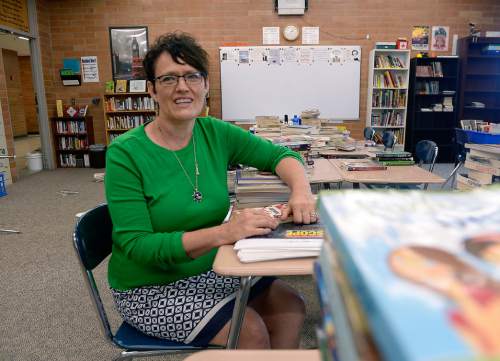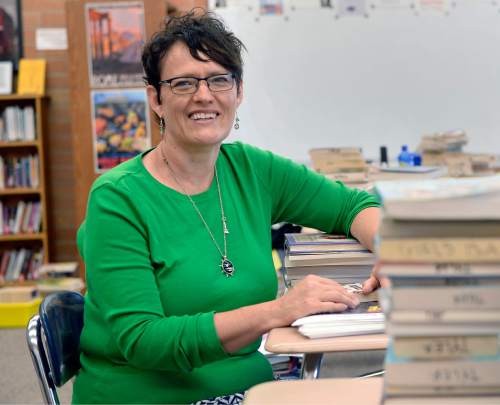This is an archived article that was published on sltrib.com in 2016, and information in the article may be outdated. It is provided only for personal research purposes and may not be reprinted.
English teacher Denée Tyler pops into classes taught by newer colleagues during her free period. After school, she coaches them on managing teen tantrums and instilling a love of literature. She plans her own lessons on nights and weekends.
"I'm willing to do it because I think it's important," said Tyler, who works at Mountain Ridge Junior High School in Highland.
If a new education policy goes into effect Friday, Tyler could end up devoting more time to her secondary role as a mentor for her colleagues.
The Academic Pathway to Teaching (APT) is a fast track to a Utah teaching license that would allow college graduates with expertise in a certain subject to teach under supervision of designated "master teachers."
The newcomers wouldn't have to enroll in teaching courses like most of their colleagues, but they would need approval from their mentors and principals to keep the job after a three-year training period.
The Utah Board of Education approved the policy in June, in part to address a statewide teacher shortfall. But, amid public criticism from individual teachers and their statewide unions, the board will review the APT at its monthly meeting Friday before allowing it to go into effect.
The pathway removes unnecessary red tape, supporters say, and makes room in schools for experts to share their passion with students. But the Utah affiliate of the American
Federation of Teachers, the Utah Education Association and scores of teachers who wrote to the board in July say it sets up schools for failure.
"To add this additional burden is going to be tough," said Heidi Matthews, president of the Utah Education Association, noting the policy does not include any funding for districts.
—
Cindy Phillips decided to move to public education after teaching Latin and history for 24 years at the private Waterford School in Sandy. Despite her experience, it took her three years to earn the credentials to teach in public school.
"This is the kind of bureaucratic journey that often discourages would-be teachers with depths of knowledge and experience," said Phillips, now executive director at the charter Weilenmann School of Discovery. "Why discourage that person from making a contribution in our schools?"
Phillips earned her credentials through the Alternate Route to Licensure, which requires teachers to prove subject knowledge and an understanding of how to teach, via online classes or coursework at Salt Lake Community College.
Not everyone looking to pivot to a teaching career has time or money for the program, Phillips said. "It's exclusive and time-intensive."
But APT is open to anyone with a bachelor's degree who passes a subject exam and background check — not just those who, like Phillips, have spent decades working one on one with students and managing classrooms full of unruly teens.
The new path accepts only applicants who already have subject mastery but waives the teaching courses required under the existing alternate route. Teachers who choose APT could upgrade their license after three years of supervision from the master teacher mentor and approval from a school principal, so long as they meet any additional district criteria.
Tyler said she already has kept busy overseeing those who have education degrees and experience as student teachers.
"I don't know that we have the time to be mentoring the people who are at ground zero," she said. "They're throwing people in who are going to be less prepared."
And veteran educators and experts question if schools could support the new wave of instructors long enough for them to learn the trade.
The policy likely would boost the state's teacher count after going into effect, said Phillip Rogers, executive director of the National Association of State Directors of Teacher Education and Certification. But Rogers said he believes the number would dip back down within a year or two, especially in low-income districts with few resources.
"I was disappointed to see there is no uniform mentoring guidance for these teachers," Rogers said.
The license likely would not be accepted in many states because it lacks formal teacher training, Rogers added.
Brent Strate, a Bonneville High School teacher and an instructor of 25 years, said he would support the policy if the board were to add an additional requirement with some sort of teaching assessment.
Strate believes there are several retired teachers with the experience and the time to return to schools as teacher coaches. But many of them view the change as an attack on the profession, he said.
"I think if the Utah board isn't careful," Strate said, "you may have a majority of experienced teachers just closing their door and being unwilling to help."
—
Teachers who have received nontraditional licenses make up only a sliver of Utah's educator workforce, at roughly 6 percent of the total 29,600, show data from the State Board of Education.
It's not enough to curb a larger negative trend. In the last five years, the number of teaching-program graduates who met state board-license criteria dropped by roughly 10 percent.
Meanwhile, school enrollments have swelled by the same percentage.
The Education and Policy Center at the University of Utah now is researching why early-career teachers are leaving and others avoid the profession altogether. The analysis came at the request of legislators and the state board this spring.
Rep. Marie Poulson, D-Cottonwood Heights, says Utah won't retain its teachers unless it raises their pay from a base level of about $35,000 annually and focuses more on effective teaching than high statewide test scores.
"I think we need to plug up this sieve," Poulson said, "rather than fill the hole with people who aren't ready to teach."
Others disagree. Sen. Howard Stephenson, the Draper Republican, said he was "completely in support of the rule" that grants more power to individual districts.
Leslie Castle, chairwoman of the state board's law and licensing committee, expects that some districts will decline to participate because they don't have master teachers available or because they already have recruited college graduates.
"It's based on the premise that we trust superintendents and principals to make these decisions," Castle said.
The new path is an option but not a requirement, she said.
"It's a starting place," Castle said. "We're willing to tweak it as we see how it unfolds."
The board has until Nov. 1 to modify the rule. If it takes no action Friday, the policy is expected to go into effect Monday.
Twitter: @anniebknox





